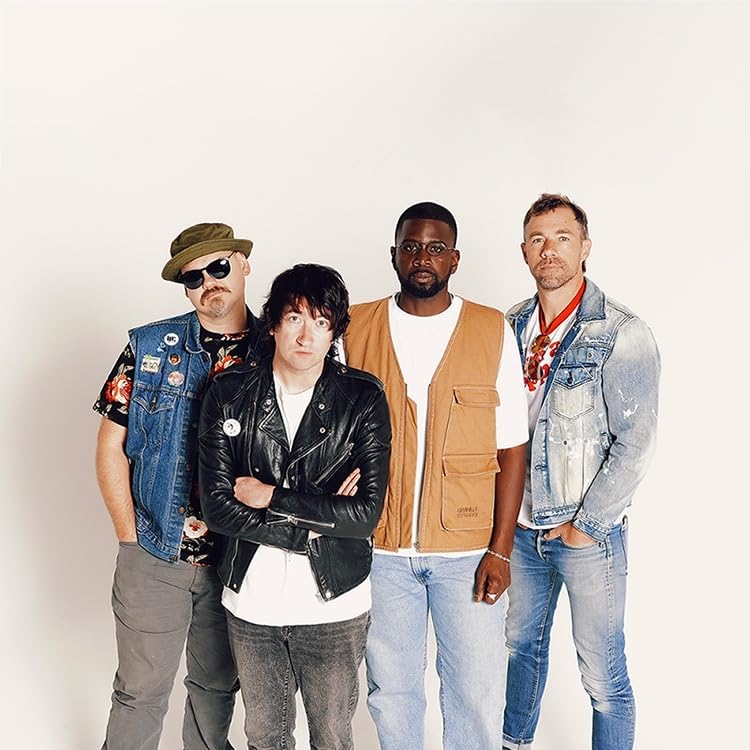 PLAIN WHITE T'S MERCH
PLAIN WHITE T'S MERCH$9.88 • Audio CD
Product Description
There's plenty of heart on Big Bad World. Says singer/songwriter Tom Higgenson, "We tried to be really ambitious and not worry about people's expectations for this record. Our vision was to do it in a classic way." To that end, the band only used gear or instruments made before 1970: vintage guitars, old Vox amps and Leslie speakers, a Ludwig drum set circa 1966. They even recorded without a click track (equivalent to walking a high-wire without a net). Because they recorded it live, you might hear imperfections. But in the case of "Big Bad World," those imperfections worked perfectly.
"Our songs in the past had a `50's and `60's influence with classic songwriting structures and harmonies," says Tom. "This time we decided, rather than punk that out and make it sound modern, we would record as though it could have been done by the Beatles or early Tom Petty. We got to a place where we sounded good live 300 nights a year, so we wanted to capture that."
Of course aiming high means nothing without good songs. Fortunately, coming off a smash hit like "Hey There Delilah," Higgenson felt inspired. "There was no second guessing," he recalls. "If I thought something was good, I went with it. The album is 10 songs, very concise and to the point."
The opening title track, co-written by Tom and Chris Thompkins ("Before He Cheats"), conveys a battle-scarred confessional offset by a deceptively upbeat melody. "Over the past year, I made lots of mistakes," Tom says, "and I wanted to write about that rather than point fingers at people. I wanted to place the blame on myself." Next, the first single "Natural Disaster," with its ballistic beat and tale of a seductive groupie, upends the band's undeserved reputation as loveably lovelorn.
"Serious Mistake" wraps a solid rock foundation with a wild orchestration. "I was in a dark place," Tom says of the song's origins. "I made a stupid mistake with a girl that I immediately regretted. For a while I harbored some guilt. So I wrote the song in an effort to work through it." Bassist Mike Retondo lends a major assist on the track, playing everything from bass clarinet and melodica to trombone, even improvising some of his parts on the spot.
The ballad "Rainy Day" serves as melancholy counterpoint to gems like "That Girl" and "1,2,3,4" (featuring the otherworldy sounds of Jon Brion on the Chamberlin), both of which embody Tom's idealized sense of pop simplicity.
Then there's "Sunlight," which just might be the new album's crown jewel. Written by guitarist Tim Lopez, the song blends a reverent melody with "Abbey Road"-level harmonies to proffer a message of forgiveness (Grammy nominee William Hamilton, the father of PWT's drummer De'Mar Hamilton, plays organ). "Last year should have been the best year of my life," says Tim. "The band was exploding. It seemed we couldn't do anything wrong. But my marriage was ending right in the middle of the success. I wrote this song to my wife. For me, it was written as a message of hope that we could work it out, that we could save what we had. We don't usually do dark songs, but the song had enough hope for Tom to latch onto."
"I Really Want You" infuses a tale of unrequited lust with a "Blonde on Blonde" vibe, right down to the saloon-style piano. "Everybody has that reaction when they see a pretty girl," Tom notes of the song. "Your heart starts racing, your life flashes before your eyes. She's the one! This was written one morning when I caught sight of a girl that for a moment seemed like the one."
As for"Meet Me in California," the song is based on another torturous misstep in the Tom Higgenson love saga. "It's an allusion to another serious mistake," he says. "You can only hurt someone so many times before it's not even about whether they forgive you. It's about why do I keep being such an idiot. I always had it in my head, even as a kid, that I was going to live in California someday. The song is about finally getting out to California and hoping something better is waiting for me there."
The album ends on a high note with "Someday," an intricate composition that swaps typical verse-chorus structure for something harder to label. "I always write hopeful songs," Tom says. "The record starts with `Big Bad World,' talking about my screw-ups, and then it ends with a message that someday it'll all work out."











